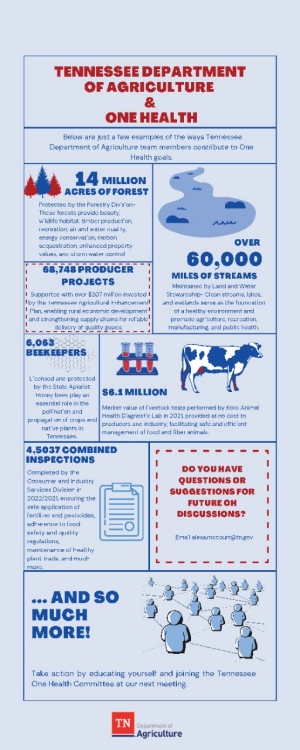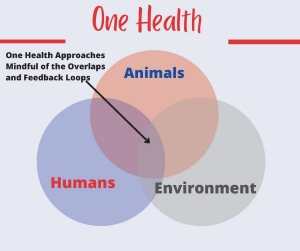One Health Initiative
The Tennessee Department of Agriculture acknowledges that agriculture links humans, animals, and our environment.
That’s why we have adopted a “One Health” approach to our work to better serve Tennessee citizens.

One Health is the collaborative effort of multiple disciplines to optimize health. One Health is an integrative approach to health and well-being, focusing on the inextricable links between environmental, human, animal, social, and economic health. The One Health concept recognizes that a holistic approach is necessary to understand, protect, and promote the health of all species. The One Health framework has been adopted by leading health organizations like the Centers for Disease Control and Prevention (CDC), United States Department of Agriculture (USDA), and the World Health Organization (WHO). One Health programs attempt to predict, identify, and account for expected and hidden or unexpected outcomes of policies and decisions.
Tackling One Health issues is like trying to untangle an intricate knot made of multiple strands, all with varying textures, sizes, colors, and lengths. Understanding and solving complex problems requires teamwork amongst contributors with differing perspectives and areas of expertise.
- Strengthen partnerships and collaboration between experts from multiple disciplines
- Identify integrative approaches to enhance health outcomes for people, animals, and the environment
- Promote sustainable, economical agricultural development
- Detect, prevent, and address risks to human, animal, and environmental health
- Educate stakeholders about One Health risk mitigation and interventions
- Build and improve public health infrastructure

Agriculture is central to the health and wellbeing of our society. The agricultural sector provides food, lumber and other raw materials, recreational opportunities, and significant jobs and revenue, all of which contribute to stable, healthy communities.
Agricultural practices influence and are influenced by diverse factors at the intersection of human, animal, and ecological health including:
- Climate and weather
- Wildlife health
- Water quality
- Natural disasters
- Antimicrobial resistance
- Food supply chain
- Worker safety

Members of the Tennessee Department of Agriculture collaborate and communicate with members of the public and professionals from health and scientific disciplines who are interested in protecting the health of humans, animals, and our environment. These relationships are leveraged across local, state, and national levels to identify and implement approaches to solving One Health challenges.
Examples of these activities include:
- Surveillance and reporting of select zoonotic diseases and concerns to the Tennessee Department of Health, the Centers for Disease Control and Prevention, and the United States Department of Agriculture
- Participation in state-level working groups to address and plan response to One Health risks like harmful algal blooms
- Emergency response planning and discussions at local, state, and federal levels
- And much more (see below)
- Animal Health: regulates movement of pets and livestock to prevent the spread of diseases that could be zoonotic or impact the food supply. This group also participates in contingency planning for One Health emergency responses. Kord Laboratory staff test samples for potential One Health risks, including zoonoses and environmental toxins.
- Consumer and Industry Services: monitors the health of Tennessee’s plants to ensure the continued movement and trade of healthy, pest-free plants; ensures pest management tools are safely administered according to regulations to protect the public and the environment; protects Tennessee’s official state agricultural insect, the honey bee, a key pollinator for the nation’s food; promotes food safety through regulatory oversight and program administration.
- Business Development: supports and promotes economically-sustainable agriculture ventures that provide nutritious food, maintain pastoral environments, and provide economic support to families across the state.
- Forestry: protects Tennessee’s forests from potential threats including fires, pests, urban expansion, and improper management. Tennessee’s 14 million acres of forest provide numerous benefits including beauty, wildlife habitat, timber production, recreation, air and water quality, energy conservation, carbon sequestration, enhanced property values, and storm water control.
- Land and Water Stewardship Section: protects more than 60,000 miles of streams, approximately 536,000 acres of lakes, and approximately 787,000 acres of wetlands in Tennessee to ensure clean water. Clean water is vital to public health, agriculture, manufacturing, and recreation, while serving as the foundation of a healthy environment.
In collaboration with the Tennessee Emergency Management Agency, Tennessee Department of Agriculture staff participate in emergency exercises and drills to prepare for and prevent disasters, including disease outbreaks, food contamination events, floods, fires, and more, all of which could have severe consequences for public health and the economy. Leading up to, during, and after these drills, participants evaluate best practices to mitigate risk, reduce losses, and strengthen future response capacity.
Tennessee Department of Agriculture staff interact with and educate clients daily about a wide variety of One Health topics. We work to advance the adoption of integrative approaches and introduce One Health concepts. Collaborative outreach efforts with our partners include those delivered to K-12 students, 4-H and extension groups, producers, industry groups, and others to advance One Health initiatives throughout the state.
The Tennessee One Health Committee promotes and supports the health of humans, animals, and the environment through cooperation and collaboration across disciplines, including local, state and federal agencies, academic institutions and outside partners. The committee serves as a starting place for equitable one health related response, advocacy and outreach.
Other participants in the Tennessee One Health Committee include staff members of:
- Tennessee Department of Health
- Tennessee Wildlife Resources Agency
- Tennessee Emergency Management Agency
- Tennessee Department of Environment and Conservation
- United States Department of Agriculture
- University of Tennessee Extension
For more information about One Health and One Health initiatives in Tennessee, please contact One.Health@tn.gov, Mary-Margaret.Fill@tn.gov, or Whitnie.Smartt@tn.gov.
If you have suggestions about potential One Health topics to be covered in future meetings, please email One.health@tn.gov.
If you would like to be added to a listserv to receive updates about activities from the Tennessee One Health Committee, please fill out this form.
Wicked problems, comparative medicine, resilience, antimicrobial resistance, food safety, food security, surveillance, emergency preparedness, biodiversity, evidence-based interventions, water quality, waste management, predictive modeling, capacity building, emergent properties, soil health, sentinel species, systems-thinking, zoonoses, human-animal bond, and many more.